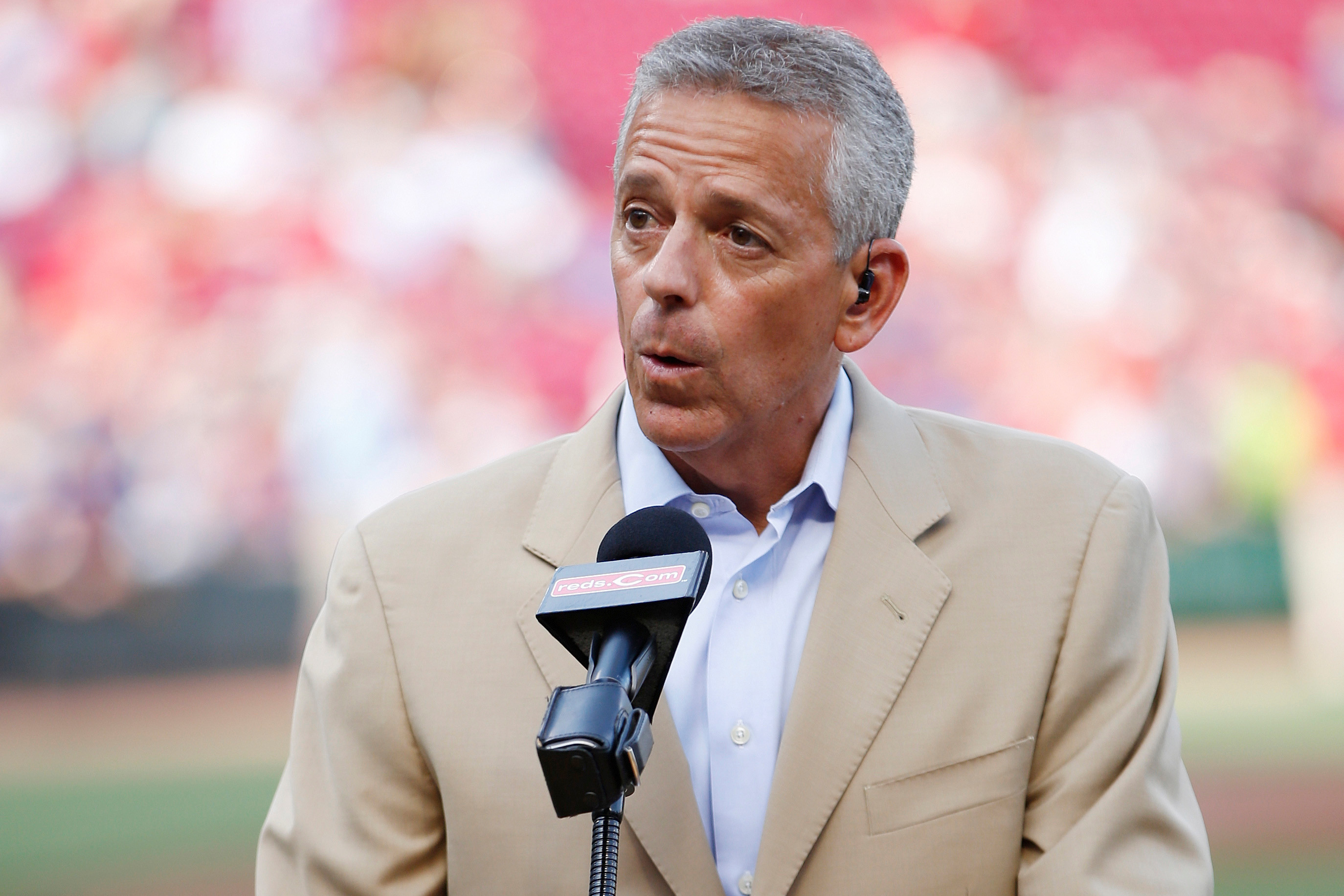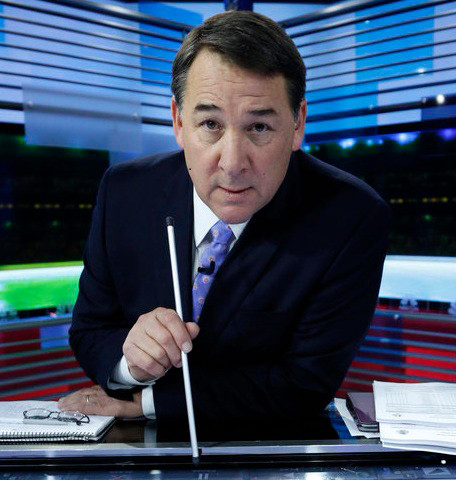More On: cincinnati reds
Marcus Stroman delivers desperately needed gem in Mets win over Reds
Mets’ offensive surge ends in loss to Reds
Mets mash seven home runs for wild 11-inning win over Reds
Joey Votto apologizes to tearful young Reds fan for ejection with signed ball
Reds fan helped Nick Castellanos troll Rob Manfred in TV interview
Thom Brennaman may very well have destroyed his career last month when he uttered a gay slur on air, and there are many who would be just fine with never hearing from the Cincinnati Reds broadcaster again. “Believe me, I know there are a lot of people who are still very angry and I understand …
Thom Brennaman may very well have destroyed his career last month when he uttered a gay slur on air, and there are many who would be just fine with never hearing from the Cincinnati Reds broadcaster again.
“Believe me, I know there are a lot of people who are still very angry and I understand that,” Brennaman told The Post on Monday in his first interview since the incident.
Nowadays, the 56-year-old is in the middle of an apology tour that has drawn skepticism about its sincerity. One stop was to have lunch with Evan Milward, a gay newscaster in Cincinnati.
“Don’t be a pawn,” Milward said he told himself before meeting with Brennaman a little more than two weeks ago.
“It was pretty clear to me early on that he was not using me,” the WCPO 9 anchor told The Post.
Milward, 31, and Ryan Messer, a 47-year-old leading LGBTQ activist in Cincinnati, are treating Brennaman as a reclamation project, hoping the man who has called Reds games since 2007 eventually will be able to serve as an ally to the LGBTQ community by teaching others how hateful the word is.
“It’s just a word to straight people,” said Messer, who has called on the Reds to reinstate Brennaman from a suspension. “To gay people it is a charged word. That word is (part of) a toolkit of weapons that people use to make someone feel less than themselves. It’s only used to degrade someone. Of course you should know it’s wrong, but you can’t assume they understand everything else packed into that word.”
When Fox Sports Ohio came out of a commercial break during that Aug. 19 game, Brennaman said, “One of the f– capitals of the world.” It wasn’t clear which area he was referring to. Then he read a promotion for the network’s pregame show.
“I have never used that word (before) in my life,” Brennaman said emphatically.
“If he used it then, he used it before,” Messer said. But “if we don’t open the dialogue to help explain (the meaning behind the word), how do we learn and grow from it? And that’s where my whole perspective comes, and I’m willing to make sure he understands that, which is why he is coming to my house Saturday to meet my family, my husband and four kids.”

The shocking moment occurred at the end of the first game of a doubleheader in Kansas City. It wasn’t until about two hours later, in the fifth inning of Game 2, that Brennaman issued an awkward on-air apology that included an interruption to call a home run, and then, after he apparently realizing the impact of what he had said added, “I don’t know if I’m going to be putting on this headset again.”
Brennaman said he couldn’t remember the context surrounding the slur.
“Everything happened so fast,” he said. “And I’m watching literally everything fall apart at the seams while trying to announce a baseball game.
“I couldn’t even tell you what happened, where it came from. … Look I said it is all that matters. The rest of it is irrelevant. I said it. And I own it. And I’m the one who has to live with it.”
Brennaman, who has been broadcasting professional games for three decades, has written apologies in Cincinnati news outlets and spoken with LGTBQ groups across the country, which have been forgiving, he said.
“The realization of the incredible hurt that I’ve caused using that word has been breathtaking,” Brennaman said. “It’s been absolutely amazing the amount of grace and forgiveness and support.”
The clip containing the slur went viral on social media within minutes, and ESPN play-by-play man Tom Hart, who was not working that game but tuned in after he had heard about what happened, said his anxiety rose while waiting for Brennaman to address the matter.
“Everything happened so fast. And I’m watching literally everything fall apart at the seams while trying to announce a baseball game.” — Thom Brennaman
“I couldn’t believe it was being left (unaddressed) when it was something that needed to be addressed not just properly but in a timely fashion,” said Hart, adding that the network should have dropped a commercial break so Brennaman could apologize without interruption.
“The issue is not that his mic was hotted up when it shouldn’t have been,” Hart said. “The issue is that he used a hateful slur to marginalize not just a group of people but also a portion of the Reds fan base.”
Brennaman, whose father, Marty, was a Reds radio play-by-play man for 46 years before his retirement last year, was pulled from the booth following the apology and hasn’t called a game since. He remains indefinitely suspended by the Reds. Last week he was removed from Fox Sports’ NFL schedule where he had worked since 1994.
Several broadcasters interviewed for this story said that Brennaman’s fall from grace did not alter the way they would approach their work in the booth or force them to be more careful with their language.
“I know that those things are not going to come out of my mouth,” said 28-year-old Joe Vasile, who has worked games for the Yankees’ Triple-A affiliate in Scranton/Wilkes-Barre. “If I have to ask myself, ‘Should I say this or should I make this joke’, I probably shouldn’t make it.”



Two days after Brennaman’s gaffe, Mike Milbury, an NHL commentator for NBC Sports, said on air, “Not even any women here to disrupt your concentration,” when discussing the NHL’s bubble environment and its effect on players.
Milbury, a 68-year-old hockey lifer, has also apologized, but is no longer providing analysis on the network this postseason.
“I think (Brennaman and Milbury) deserve to lose their jobs, and go back to school and get new friends. I don’t think they should be forgiven,” said Andrea Press, a University of Virginia Media Studies and Sociology professor, who has authored a handful of books on feminism. “I can’t say I’m surprised about stereotypes of women uttered in the context of major league sports, but we should have moved way beyond those as well.”
Brennaman said, “if I get another chance, someone will be hiring a better person than the person who walked out the door that night on August 19.”
There is a history of broadcasters being offensive on air, and sometimes they don’t recover fully. In 2007, Don Imus, a former WFAN shock jock who died in December, made inappropriate racial comments about black women basketball players at Rutgers, and saw his career suffer.
Jimmy “The Greek” Snyder, was fired by CBS in 1988 for making racial generalizations about black athletes, remarks that followed him to his death in 1996.
This also isn’t the first time the Reds have been mired in controversy because of what someone within their organization has said.
Former owner Marge Schott, who died in 2004, acknowledged in 1992 that she owned Nazi memorabilia and used racial and homophobic slurs. She was fined $250,000 and suspended by MLB before selling her interest in the team in 1999.
“Cincinnati wasn’t the always most welcoming city (for LBGT people)” though that has changed dramatically, said Messer, who in the early 2000s helped lead an effort to repeal an ordinance that discriminated against the LGBTQ community in the workplace.
“I believe I can tell when someone is sincere and I heard that in (Brennaman’s) voice.”
Millward heard the same.
“We should forgive, and we largely have forgiven,” Millward said. “But you can’t just then sweep it under the rug and then place it into this whole societal cancel-culture thing. If we just shut people down, and tell them they’re trash and that they’re canceled, then we’re avoiding a difficult dialogue.”












